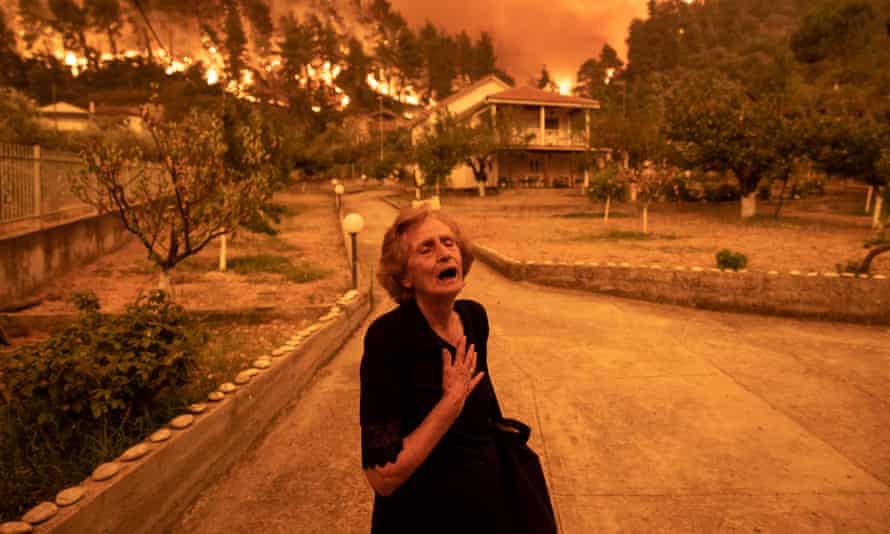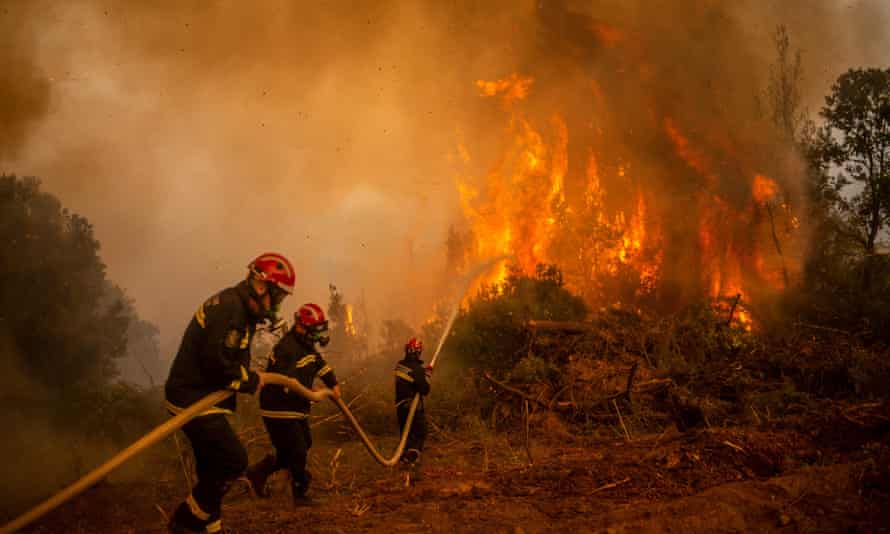Wildfires rage in Greece and Italy as EU mounts firefighting operation
Week of blazes forces evacuations and brings devastating scale of destruction to large areas of southern Europe

First published on Mon 9 Aug 2021 11.19 EDT
The devastating scale of destruction from a week of wildfires in Greece and Italy was being assessed as the EU mounted one of its largest firefighting operations ever and smoke from forest fires in Siberia reached the north pole.
As UN experts on Monday said global warming was advancing faster than feared and that humanity was “unequivocally” to blame, firefighters and local residents battled massive blazes on the island of Evia, east of Athens, for a seventh straight day.
The Greek prime minister, Kyriakos Mitsotakis, apologised for failings in tackling the blazes in a televised address to the nation. He said burnt areas would be reforested with more fire-resistant trees and compensation would be paid from a EUR500m emergency relief fund.
Mitsotakis said 586 fires had erupted in the past week “in all corners of Greece” and that the resulting destruction had “darkened the hearts of all of us”. He praised the professionalism of the emergency services but acknowledged “misjudgments”, saying: “I personally want to say sorry for any weaknesses that have appeared.”
More than 2,600 people have so far been evacuated from Evia, the country’s second largest island, on a flotilla of boats, with elderly people and infirm being forced overnight Sunday to seek refuge on ferries or sleep on sun loungers on the beach.

Greek media reported that multiple previously extinguished fires had reignited on Evia and were moving at speed towards yet more villages and the 7,000-population town of Istaia.
Wildfires have ravaged large areas in southern Europe as the region endures its most extreme heatwave in three decades. Twelve people have died in Greece, Turkey and Italy, with many more injured. Huge fires also have been burning across Siberia in northern Russia for several weeks.
A Russian weather monitor said on Monday the forest fires ravaging Siberia were worsening as Nasa satellite images showed smoke from burning forests travelling 1,850 miles (3,000km) to reach the north pole, calling it “a first in recorded history”.
The weather monitoring institute Rosgidromet said nearly 3.4m hectares were burning in Yakutia, Russia’s largest and coldest region, which sits atop permafrost. Russia’s forestry agency said this year’s fires have ravaged more than 14m hectares, making it the second-worst fire season since the turn of the century.
Greece has experienced a rolling summer of heatwaves with prolonged and unprecedented periods of 45C-plus temperatures. Hopes of a respite after a drop in temperatures over the weekend were shortlived, with forecasters predicting the country would be back in heatwave as of Monday, with winds also picking up.
Firefighters backed by reinforcements from 22 nations were struggling on Monday to douse reignited fires in the southern Peloponnese, eastern Mani and on Crete, as officials in the capital, Athens, itself devastated by now-extinguished blazes on its northern fringes, began assessing the damage.
At least 300 homes were estimated to have been destroyed in the blazes, which also tore through an untold number of businesses, farms and forest land. On Evia, more than 50,000 hectares of pine forest had gone up in flames, while the destruction in the Peloponnese is described as incalculable.
Greek firefighting forces have been clearly overwhelmed, prompting two dozen countries to send help. Nine planes, nearly 1,000 firefighters and 200 vehicles have been dispatched to Greece by France, Cyprus, Sweden, Spain, Croatia, the Czech Republic, Serbia and Romania, with Germany, Poland, Austria and Slovakia making further offers to help over the weekend.
EU countries have sent 14 firefighting planes and 1,300 rescuers to help put out devastating blazes across the Mediterranean.
“We are mobilising one of Europe’s biggest-ever common firefighting operations as multiple fires affect several countries simultaneously,” said the EU commissioner for crisis management, Janez Lenarcic. The UK announced on Saturday it was also sending firefighters to help Greece deal with the huge blazes.
In Athens, Mitsotakis’s centre-right administration has come under fire by local officials and people on the ground for a response that has at times appeared chaotic. Mayors on Evia have blasted authorities for providing insufficient help.
“We have been shouting but they haven’t been listening,” Giorgos Stamoulos, the vice-mayor of Mantoudi, told Greek TV on Monday. “All in all our municipality extends across 5,840 hectares and 4,500 have burned. About 1,000 homes have burned. Where is [the government] going to put all these people who haven’t got homes?”
With fires approaching, Greek islanders in remote communities have begged to be airlifted out. Others have been filmed desperately trying to save their properties with little more than garden hoses and buckets.
With the government prioritising public safety three years after fires in the seaside resort of Mati left 202 dead, there has been little loss of life, but hospitalisations and injuries are becoming ever more prevalent. Four volunteer firefighters have been severely burned, with two said to be in critical condition.
In Italy, the civil protection authority warned on Monday of more fires to come as temperatures in parts of the country reach 45C . Firefighters have dealt with 44,442 wildfires in Italy since 15 June, compared with 26,158 last summer, with the majority occurring in Sicily followed by Puglia, Calabria and Sardinia.
The most extreme blazes are in the southern region of Calabria, where two people were reported to be dead. On Sunday, almost 10 hectares of pine forest went up in flames in the national park around Mount Vesuvius in Campania, while in Molise, hotels and holiday homes in the beach resort of Campomarino Lodi were evacuated.
Weather forecasters said the heatwave was an “extreme event with few precedents”. Fabrizio Curcio, the chief of Italy’s civil protection authority, said the worst may now be over but warned that rising temperatures mean vigilance was vital.
“We are working tirelessly to contain the fires, but we ask citizens for the utmost cooperation and caution,” Curcio said. “It is essential to avoid any behaviour that could start fires and to promptly report even small ones.”